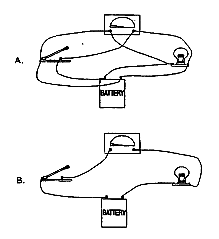What it's all about...
A decade ago, I got concerned about what was happening with Kentucky’s very aggressive education reform, which was launched by the Kentucky Education Reform Act (KERA) of 1990. My daughter had just received the second lowest of four possible writing scores from Kentucky’s new, statewide assessment program. She had won the Kentucky PTA’s statewide writing contest one year earlier; so, her writing score certainly seemed out of line. I then learned our high school was in imminent danger of state takeover as a result of this assessment. Our school was one of the strongest high schools in Kentucky, at least by most measures such as numbers of students going on to college and so forth, the entire situation seemed questionable.
I asked
for advice in an education forum and was encouraged to look at questions
from the test. Our high school principal said this was possible, and I
shortly received a handout of questions that had been used during the
first year of the assessment. These questions were then released as sample
problems for the schools.
That is how I discovered the following question, which appeared on Kentucky's
12th grade science assessment in 1992:


Surprised that a completely incorrect question made its way onto Kentucky's very high stakes assessment, I wrote the Kentucky Department of Education (KDE) to find out what had happened and to offer my assistance to help create better questions.
It took three months to hear back from the Department. When the letter finally arrived, it confirmed my suspicions that the Kentucky assessment had some very serious problems. This letter began by admitting the question was indeed wrong, which I already knew, of course. The letter then went on to say that the sender did not know who wrote the question, which was astounding evidence of poor records keeping. Since the assessment had high stakes consequences for schools, I could just imagine what would happen if there was a court challenge and the KDE couldn't even identify the people who wrote the questions. But, there was more. The letter's author indicated that he could not identify the knowledge that was intended to be measured with the question. This, too, was an incredible admission. Kentucky's reform was supposed to be based on standards, but these standards apparently had no traceable influence on the questions that showed up in the state's test.
The letter did make it clear that my offer to help was of no interest. That was especially troubling since the process badly needed help. Overall, the letter provided even stronger evidence than the original wiring diagram question that people who were not really suitable for the task were in charge of Kentucky's assessment program. This realization launched me on an independent, data-based course of research into Kentucky's education reform. While my initial focus was Kentucky, this endeavor also led to my involvement with the National Assessment of Educational Progress (NAEP), and my nationally important discovery in 1999 that the NAEP's validity was becoming subject to question over the issue of uncontrolled exclusion of students with learning disabilities.
Through
the years I created a fairly large number of newsletters (over 70 to date)
and a number of reports. Until now, these have generally only been available
to legislators and members of several very active education listservs.
Now, at the request of many individuals, I have established the eddatafrominnes
web site so that my reports can be easily accessed by anyone with the
interest.
This site will be a major repository for my past and future work. As time
goes on, the site will grow to allow exchange of ideas from others with
similar interests. I think readers will find here some highly original
data and analysis that simply doesn't seem to be available from traditional
education resources. Here may be found a different "take" on a number
of issues concerning education, primarily focused on Kentucky's reform,
but with a fair leavening of national issues, as well.
The goal
of all this effort is quite simple. I think American children need the
very best education that we can provide. I don't think we can accomplish
this without an extensive, respectful exchange of informed ideas. I am
quite convinced that this discussion must be extended beyond the traditional
education establishment; so all viewpoints will be welcome here. I think
many people share my sense of obligation to get involved even if the education
establishment isn't always receptive. I intend this site to help meet
my obligation to our children, and I encourage the widest possible discussion
of the data and observations that are presented herein.
Richard Innes
